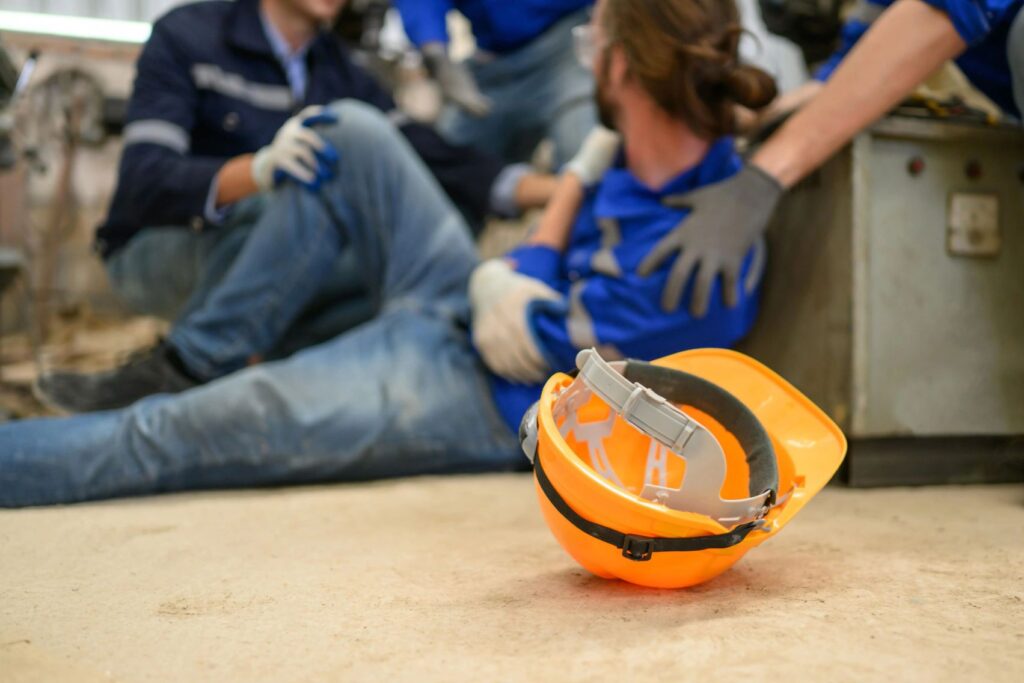
At Cesar Ornelas Injury Law, we focus on helping injured workers and can guide you through the legal steps to get the compensation you deserve. We offer a free consultation, so you can discuss your situation without any cost. Don’t let your employer’s pressure affect your health and rights. Call us at 210-957-2103 to talk with our experienced legal team today. We’re here to help you understand personal injury law and fight for the justice you deserve.
Understanding Your Rights as an Oilfield Worker
As an oilfield worker, you have the right to a safe workplace, protected by both federal and state laws. These rights include receiving safety training, access to necessary safety gear, and the ability to report unsafe conditions without fear of retaliation. If you’re injured on the job, you have the right to seek medical treatment and to file a workers’ compensation claim or a personal injury claim. This allows you to obtain compensation for medical expenses, lost wages, and other damages.
Laws like the Jones Act and the Federal Employer’s Liability Act require employers to ensure the safety of their workers. If you work offshore, the Outer Continental Shelf Lands Act (OCSLA) also protects you, offering medical care and wage compensation if you get injured.
Understanding these federal protections is crucial for receiving the right compensation and benefits if you’re hurt on the job. You can report any safety violations to OSHA, which helps enforce safety rules. Reporting injuries and accidents properly is key to safeguarding your rights.
Knowing your rights is the first step in protecting yourself in the oil and gas industry. Being aware of what you’re entitled to helps you navigate the challenges of worker safety and compensation.
Can I Refuse to Perform a Task if I Feel It’s Unsafe?
Yes, as an oilfield worker, you have the right to say no to a task if you think it’s dangerous for your safety or health. This is supported by federal laws like the Occupational Safety and Health Act (OSHA), which focus on keeping workers safe. If you find yourself in a risky situation, tell your supervisor and ask them to fix the issue. If nothing changes, you have the right to refuse the task without worrying about getting in trouble.
Make sure to keep a record of your concerns and any conversations with your employer about the unsafe condition. This documentation is important if you need to resolve any disputes or file a complaint with OSHA. Remember, your safety is the most important thing, and you should never feel forced to risk your health for a job.
Immediate Steps After an Oilfield Injury
Experiencing an oilfield accident can be overwhelming, but taking the right steps immediately can protect your health and legal rights.
- Seek Medical Attention: Prioritize your health by seeking prompt medical care, regardless of how minor the injury may seem. Immediate medical attention not only aids in your recovery but also creates essential documentation for any potential legal claims related to oilfield accidents.
- Report the Injury: Notify your supervisor promptly to create a formal record in line with workplace safety regulations. This step ensures there is a formal record that adheres to workplace safety regulations. Document the time, date, and the individual to whom you reported the injury.
- Gather Evidence: Collect evidence at the accident scene. Take photographs of the scene, the equipment involved, and any hazardous conditions. Obtain contact information from witnesses who can support your injury claim. These actions are critical for building a strong case if you decide to file a personal injury claim.
- Document Everything: Keep detailed records of all medical treatments, medical bills, and any communications with your employer regarding the injury. Maintaining thorough documentation strengthens your claim and helps determine the extent of damages and compensation.
- Consult a Legal Professional: Reach out to an oilfield accident attorney to understand your rights and legal options. A knowledgeable attorney can guide you through the legal process, ensuring you receive fair compensation and that your rights are protected.
- Avoid Signing Documents: Do not sign any documents from your employer or insurance company without consulting a lawyer. Signing documents without proper legal advice can affect your ability to seek full compensation.
- Report Employer Misconduct: If your employer pressures you not to report the injury, document any misconduct, and report it to higher authorities or regulatory bodies. This ensures your rights are upheld and protects you against retaliation.
Following these steps can greatly influence the outcome of your case and ensure you get the compensation you deserve. Remember, after an oilfield injury, your health and legal rights are of utmost importance. At Cesar Ornelas Injury Law, we are dedicated to guiding you through each step of the legal process to protect your rights and help you secure the compensation you need. Our successful track record in handling oilfield accident cases guarantees you receive the best possible representation.
Importance of Seeking Medical Attention

Keep a detailed record of all medical treatments and bills. This documentation supports your claim and helps determine the compensation you deserve. Documenting the injury and accident scene is also important for any future claims or disputes.
Delaying medical treatment can negatively impact your ability to work or live normally in the future. Seeking immediate medical attention after an injury not only protects your health but also your legal rights.
Collecting Evidence for Your Claim
Gathering evidence is critical for supporting your compensation claim. Reporting your injury to your employer promptly is important, as it can impact your eligibility for workers’ compensation. If you fail to report the injury, you risk losing evidence, which can complicate any future claims.
It’s essential to document the accident scene thoroughly. Take photos of any unsafe conditions or misconduct and collect contact information from witnesses. Keep detailed records of your medical treatments to show the severity of your injuries and how they affect your life.
When collecting evidence after an accident, consider the following:
- Photographs and Videos: Capture images and videos of the accident scene, including any hazardous conditions, equipment involved, and visible injuries.
- Medical Records: Keep detailed records of all medical treatments, medical bills, and prescriptions related to the injury.
- Witness Information: Obtain contact details from witnesses who can corroborate the accident and your injury claims.
- Accident Reports: Secure copies of any official accident reports filed with your employer or relevant authorities.
- Employment Records: Collect documentation related to your employment, such as pay stubs or work schedules, to support claims for lost wages.
- Communication Logs: Document all communications with your employer, insurance company, or medical professionals regarding the injury.
- Safety Violations: Record any evidence of safety violations or misconduct that contributed to the accident.
- Personal Notes: Keep a journal detailing your recovery process, including pain levels, emotional distress, and any impact on daily activities.
These actions are crucial to ensure you obtain the compensation you deserve. At Cesar Ornelas Injury Law, our legal team is dedicated to guiding you through each step, ensuring you collect the necessary evidence to build a strong case for your oilfield accident claim.
Handling Employer Pressure Not to Report
If your employer pressures you not to report an injury, it’s not only wrong but often illegal. You have the right to seek legal advice for any documents related to your work injury claims. There are some strategies to resist employer pressure not to report an injury.
Keep a detailed record of any conversations or written communications where your employer pressures you not to report your injury. This may be essential evidence should you decide to seek compensation. Some employers might try to make you sign contracts that limit your ability to claim damages. By keeping thorough records, you protect yourself from such unethical practices and ensure your rights are upheld.
Once you’ve gathered enough documentation, report the misconduct to higher authorities or relevant regulatory bodies. You have legal rights that protect you when you report injuries and misconduct. Understanding these rights will help you get the necessary assistance to address the issue.
What Signs Indicate My Employer Is Pressuring Other Workers Not to Report Injuries?
Recognizing the signs that your employer may be pressuring workers not to report injuries is critical for maintaining a safe work environment. Here are some indicators to watch for:
- Lack of Incident Reports: A noticeable absence of documented accidents or injuries, despite the high-risk nature of oilfield work, could suggest underreporting due to employer pressure.
- Discouragement from Supervisors: If supervisors or management frequently advise workers to handle injuries “in-house” or discourage them from seeking medical attention, this is a red flag.
- Fear of Retaliation: Workers expressing fear of losing their jobs or facing other forms of retaliation if they report injuries may indicate a culture of intimidation.
- Inconsistent Safety Meetings: If safety meetings are irregular or lack substance, it might reflect an employer’s disregard for proper reporting and safety protocols.
- Pressure to Sign Waivers: Being asked to sign waivers or documents that limit reporting or seeking compensation for injuries can be a sign of unethical practices.
- Gossip or Rumors: Hearing rumors about incidents not being reported or workers being coerced into silence can be a sign of systemic pressure from the employer.
If you notice these signs, it’s important to document them and seek legal guidance to protect your rights and ensure a safe workplace.
Legal Consequences of Not Reporting an Injury

Not reporting an injury can have serious legal consequences. Employers might argue that the injury was not work-related, which can affect your eligibility for compensation. Failing to report can also impact any future legal actions against employers or third parties.
Injured workers can seek compensation for financial losses, including lost wages, due to an oilfield incident. However, in Texas, employers are not required to have workers’ compensation insurance, which can complicate legal options for an injured worker.
If you’re uncertain about how to report the injury or need help, consulting a skilled oilfield accident attorney at Cesar Ornales Injury Law can guide you through the legal process effectively.
Potential Compensation
If you’re hurt in an oilfield accident, knowing what compensation you can receive is important for your recovery and finances.
- Medical Expenses: This includes all costs related to medical treatment, such as hospital bills, surgery, medication, rehabilitation, and any ongoing medical care required due to the injury.
- Lost Wages: If the injury prevents you from working, you may be eligible to receive compensation for the income you lose during your recovery period.
- Pain and Suffering: Compensation may also be available for physical pain and emotional distress resulting from the accident.
- Disability and Disfigurement: If the injury leads to a permanent disability or disfigurement, additional compensation may be sought to address the long-term impact on your life.
- Loss of Earning Capacity: If the injury affects your ability to earn the same level of income in the future, you may be entitled to compensation for this loss.
- Punitive Damages: In cases of gross negligence or willful misconduct by the employer, punitive damages may be awarded to punish the responsible party and deter similar behavior in the future.
At Cesar Ornelas Injury Law, we are committed to helping you get the compensation you deserve after an oilfield accident. Our skilled legal team will guide you through every step of the legal process to ensure you receive the financial support you need to recover and move forward with your life.
How Cesar Ornelas Injury Law Can Help You

At Cesar Ornelas Injury Law, we focus on helping people injured in oilfield accidents get the compensation they deserve. We know that each injury case is different, so we give individual attention to every client.
If you’ve been injured in an oilfield accident, reach out to Cesar Ornelas Injury Law. We are dedicated to protecting your rights and ensuring you receive the compensation you need to recover and move forward with your oilfield accident lawsuit. Don’t wait—call us today at 210-957-2103 for a free consultation and let our experienced legal team help you seek the justice you deserve.




